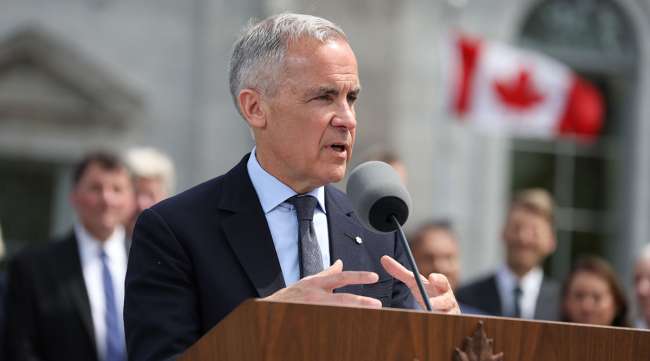If the negotiations with the U.S. fail, the government plans to retaliate, Canadian Prime Minister Mark Carney said. (David Kawai/Bloomberg News)
Prime Minister Mark Carney said Canada and the U.S. are in “intensive” talks about the countries’ trade relationship, explaining his government’s decision not to respond yet to the Trump administration’s doubling of steel and aluminum tariffs.
“Those discussions are progressing,” the Canadian leader told reporters June 4 in Ottawa. The government will take time to consider what it will do in reaction to the U.S. move to hike tariffs on foreign-produced metals to 50%, he said.
But if the negotiations with the U.S. fail, the government plans to retaliate, Carney said in the House of Commons.

Lutnick
Dominic LeBlanc, the point person in Carney’s cabinet for U.S. trade talks, was in Washington on June 3 to meet with Commerce Secretary Howard Lutnick — the second trip he has made to the U.S. capital in the past two weeks.
Carney said the higher tariffs are “unjustified, they’re illegal, they’re bad for American workers, bad for American industry, and of course for Canadian industry as well.”

Trudeau
Still, his pause on retaliation represents a shift in approach from his predecessor, Justin Trudeau, who typically responded to any new Trump tariffs by announcing matching counter-tariffs on U.S.-made goods right away. In March, Trudeau’s government hit back with 25% import taxes on about C$60 billion ($43.9 billion) worth of American products, including a wide range of steel and aluminum items.
But Carney has since exempted some of those products from counter-tariffs. In April, the government announced a six-month pause on the import taxes for certain products used in manufacturing and in critical sectors like health care and public safety.

Ford
Carney is already facing pressure in Canada to retaliate quickly against President Donald Trump’s tariff increase. Ontario Premier Doug Ford called on the national government to raise its counter-tariffs on steel and aluminum to match the U.S. ones.
Catherine Cobden, head of the Canadian Steel Producers Association, said Carney must level the playing field and fight back with retaliatory measures. “That is a concern for us with respect to just trying to recapture some of our domestic market share as we’ve lost access to the U.S. market,” she said, explaining that some Canadian manufacturers are still purchasing U.S. steel.
“It was concerning enough at 25%. At 50%, it’s going to devastate the industry,” she said. Canadian producers have already shed about 700 jobs so far as shipment volumes drop, she said.
Jean Simard, who leads the Aluminium Association of Canada, said producers in the sector are willing to give negotiations with the U.S. a chance before pressuring Carney to retaliate.
Much of the U.S. tariff has so far been absorbed into a regional North American premium, the so-called U.S. Midwest premium — which means some of the duty is passed on to end users. Producers still bear part of the cost, especially with value-added products, which are typically tied to contracts.
The AAC estimates that a 50% duty means an added cost of almost $75 million per week on Canadian exports of the metal to the U.S. “No business can withstand for a long time this kind of situation,” Simard said.
“These tariffs are killing investment in our steel, aluminum and auto sectors, and we are already seeing the consequences in lost jobs and economic instability,” Unifor President Lana Payne said.
Canada is the largest foreign supplier of steel to the U.S., representing about 6% of the country’s consumption in 2024, according to MEPS International. It has a much larger footprint in aluminum and is the biggest foreign seller of aluminum consumed in the U.S.

Smith
Alberta Premier Danielle Smith told Bloomberg Television that there’s optimism in Canada that the government will be able to reach an agreement with the White House on “some kind of detente or interim step toward getting to a comprehensive renegotiation of trade.”
On June 4, Canada’s Finance Department confirmed the government has collected C$1.7 billion ($1.2 billion) in revenue from retaliatory tariffs on imported U.S. goods. That amount covers the period between March and May, and is net of reimbursements to firms that are importing products that qualify for the short-term exemptions.
In April, the election platform for Carney’s Liberal Party estimated that retaliatory tariffs would raise C$20 billion in revenue this fiscal year.






